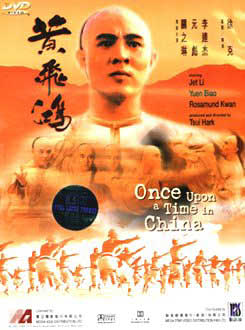Once Upon a Time in China

Review by YTSL
Amidst all the laudatory raves that "Crouching
Tiger, Hidden Dragon" is getting in the West for being an intelligent and
mature martial arts drama, several Hong Kong films come to my mind that I
consider to be equally -- if not more -- capable of fitting that bill which
seems to have been exclusively accorded to Ang Lee's wuxia work. The
most philosophical of these would undoubtedly be "Ashes of Time". However,
Wong Kar Wai's desert epic has a few contenders -- all of them productions
that bear the imprint of Tsui Hark -- for most emotionally powerful yet still
almost bursting at the seams with messages for the mind as well as the heart
to muse and mull over.

One of these is the first ONCE UPON A TIME IN CHINA, a packed and lengthy
-- it's 134 minutes long when uncut -- celluloid masterpiece: That
I had viewed four times prior to writing this review but -- until this last
time -- never in an ideal form (due to technical problems but also (Malaysian)
censorship); and whose substantial as well as diverse contents I have sometimes
felt so overwhelmed by as to cause me to doubt my ability to adequately describe
and critique it. As it is, there is a part of me that does wonder whether
Tsui Hark would have crammed so much into a single film if he had known that
it would spawn as many sequels as it did. Alternatively, it does seem
to be an integral part of this brilliant auteur's signature style to create
multi-layered works which mix and match genres like there's no tomorrow.

Teasing apart elements and strands of ONCE UPON A TIME IN CHINA, here's noting
that: It is pretty much a given that any film that stars Jet Li (as
the legendary healer and kungfu master, Wong Fei Hung) will be a marvelous
action spectacle; this especially so when the work also features Yuen Biao
(his Foon character is sometimes a fool in not knowing which master's path
to follow, and thus one of this complex, involved offering's wild cards)
and Yan Yee Kwan (as an impoverished martial exponent called "Iron Vest"
Yim who appears willing to do anything to make a living) in prominent roles.
Suffice to say that this cinematic extravaganza's extended climactic battle
-- which involves loads of step ladders and rages on more than one floor
-- is a guaranteed jaw-dropper. It also will be pointed out that what
passes off as secondary skirmishes here would be oh so sweet icing on most
other movies' cakes (A favorite of mine has Jet Li giving one of his sublime
demonstrations of the uses that an umbrella can have when wielded by an innovative
martial artist).

There also is humor to be found in sections of this sprawling production.
Among ONCE UPON A TIME IN CHINA's chief suppliers of -- by my way of thinking,
sometimes actually unnecessary -- comic relief are Kent Cheng (playing Porky,
a meat seller who is one of Wong sifu's senior kungfu disciples) and Jacky
Cheung (whose Buck Tooth So character -- an American-Chinese who has come
to study the healing arts with Master Wong -- stammers when he speaks Cantonese
but is perfectly eloquent when utilizing the English language to communicate).
Quite a bit of amusement too is to be found in the East-West culture clashes
that often ensue in the presence of a young woman Wong Fei Hung respectfully
addresses as Sap Saam Ee (i.e., 13th Aunt), who -- at the beginning of the
film -- had just returned to China after spending two years in England (The
Convent school educated Rosamund Kwan gives this character and the film in
general more than a bit of charm, tenderness and class).

As evidenced by the following lines in a conversation between Wong Fei Hung
and his honorary aunt which took place at the same time as the mundane measuring
of a man for a suit and a romantic play with shadows (all of which involved
the same two individuals), ONCE UPON A TIME IN CHINA additionally contains
quite a lot of cultural and outright political arguments, contemplations
and discussions:-
"Why do we have to learn from the West?"
"They invented things like the steam engine and
many other things. If we don't learn (from them), we will get left
behind."
"When you get the chance, tell me more about
how great the outside world is."
"...Everything will change. China will
change with the world."
The fact that this is the sort of cultural political
debate that continues to occur in East Asia, among high officials of national
governments as well as ordinary people, makes many of the thrusts, parries
and points contained in this historical costumed production salient now as
well as in the Ching dynastic period that is this offering's temporal setting.

At the risk of overstating my case, this (re)viewer will strongly suggest
that whoever sees this multi-faceted film as merely -- or even primarily
-- an action flick is missing out on so much that its makers seek, and it
has, to offer. Ditto with regards to those who are apt to overly-simplify
and dismiss its director-producer's political stance as virulently anti-Western.
Instead, ONCE UPON A TIME IN CHINA comes across to me as a simultaneously
nuanced as well as colorful -- yet also at times painfully and unsettlingly
dark visioned -- piece of work; a visual, verbal and musical presentation
that contains so many symbolic as well flamboyant elements, in combinations
that provide one with a grand feast for the eyes but also much food for thought
and emotional -- sometimes even soulful -- sustenance.

My rating for the film: 9.5







